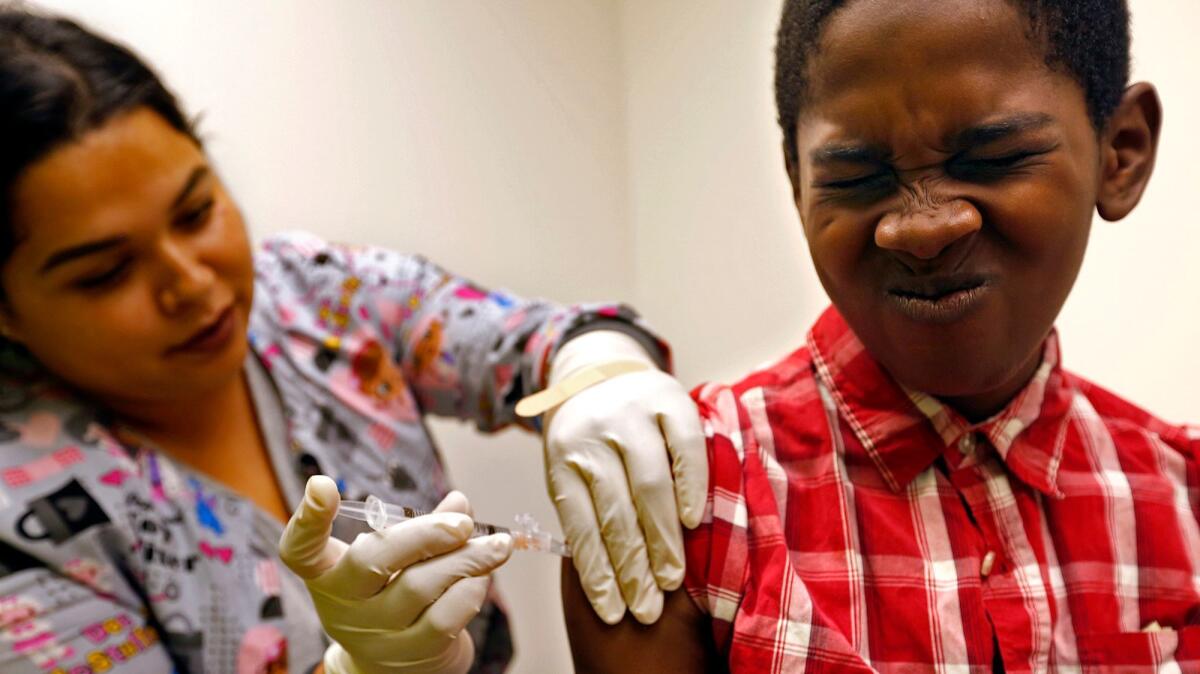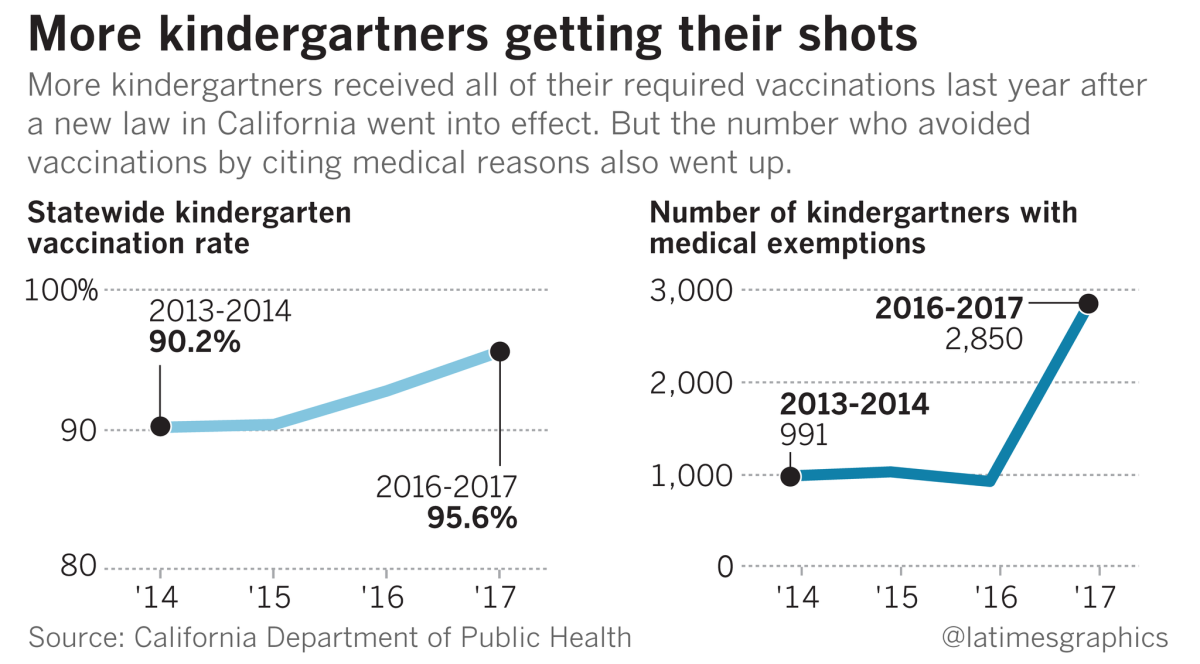Despite California’s strict new law, hundreds of schools still don’t have enough vaccinated kids

Even with a new law that has boosted kindergarten vaccination rates to record highs, hundreds of schools across California still have so many children lacking full immunization that they pose an increased risk of disease outbreaks, according to a Times analysis of state data.
At nearly 750 schools, 90% or fewer kindergartners had been fully vaccinated last year, the analysis found. Experts say the rate should be at least 95% to prevent the spread of highly contagious diseases such as
California’s tougher inoculation law, known as SB 277, was approved in 2015 after a measles outbreak that originated at Disneyland. The law bars parents from citing religious or personal beliefs to excuse their children from immunizations, but some who already had such exemptions were allowed to keep them.
The rest of the unvaccinated children need a form signed by their doctor saying they had a medical reason not to get their shots.
In the school year that began last fall, the law’s first year, the number of kindergartners in California with medical exemptions tripled, the analysis found.

Doctors say that at most, 3% of people could have a medical reason for not tolerating vaccines, such as a gelatin allergy or because they’re undergoing chemotherapy.
But the Times analysis found that at 58 schools, 10% or more kindergartners had medical exemptions last fall. The rate topped 20% at seven schools.
“That’s just totally wrong,” said Dr. James Cherry, a UCLA research professor and senior editor of the “Textbook of Pediatric Infectious Diseases.” “This idea of 20% having medical exemptions is nonsense, and certain doctors buy into that, but it’s wrong.”
Look up your kindergarten's vaccination rate in The Times' online database »
Experts say some parents who are hesitant about vaccines may be asking doctors to vouch that their children have medical reasons to avoid them or get them later than when they’re required by law.
Public health advocates cheered the law’s success when the fraction of California kindergartners who were fully vaccinated jumped to 96% last year.
But as a new school year begins this fall, the high numbers of unvaccinated kids at hundreds of schools last year have raised questions about whether even one of the strictest laws in the nation can persuade parents who are skeptical or fearful of vaccines to immunize their children.
At Sebastopol Independent Charter in Sonoma County, 11 of 45 kindergartners had a medical exemption from vaccination last school year. An additional 17 had personal belief exemptions that rolled over from the previous year. All together, only about a third of the class was fully vaccinated — among the lowest rates in the state.
“To be honest, I’ve been a little uneasy about the amount of these medical exemptions. It just kind of sticks out,” said executive director Chris Topham, who added that charter schools are already under extra scrutiny. “It’s not something I’m proud of or excited about.”
He thinks the low rates are due in part to the politics of Sonoma County, which has a “very high population of liberal thinkers and maybe a little bit of counter culture.”
Topham said he invited a county health official to speak to parents about vaccinations and was recently audited by the health department, but there’s not much he can do if parents come in with signed medical exemption forms.
“I would be concerned if there was an outbreak,” he said. “Safety for a school leader is always No. 1, even before education, frankly.”
Where are these at-risk schools?
Statewide, private and charter schools account for the majority of schools where 90% or fewer kindergartners had received all their shots, the Times analysis found. The analysis included 6,500 schools with 20 or more kindergartners — the state did not provide data on schools with fewer than 20 kindergartners.
A third of the schools with low vaccination rates were in Los Angeles County, followed by San Diego and Orange, the analysis found.
Many school administrators said they did not want to comment on decisions made by parents. Others could not be reached for comment or were out of the office for summer vacation.
Before kindergarten, children must be vaccinated for several diseases, including
Dr. Pia Pannaraj, pediatric infectious diseases specialist at Children’s Hospital Los Angeles, said that as many people as possible in a community need to be vaccinated against a disease so if it’s introduced it can’t spread, protecting even those who can’t get inoculated for medical reasons.
Schools in particular can be hotbeds for viruses, she said.
“The kids are always close together, they don’t wash their hands as often as they should, they touch everything,” she said. “It’s very easy for infections to spread.”
But Christine Kuglen, who runs Innovations Academy, a charter school in San Diego, she felt as though the law had put her in an uncomfortable position of policing parents.
“If this was all started by Disneyland having an outbreak of measles ... then why isn’t Disneyland allowed to check vaccination rates at the door? That’s where people got it, not here,” she said. “I wish the legislators who passed this would’ve had to sit with these parents and tell them, ‘I’m sorry, your child can’t go to school.’”
Kuglen said she’s talked to parents who’d decided not to attend the school after she explained the law’s requirements. She said she’s unsure what happened to them.
“If it’s true what it says in the California Constitution that everyone’s entitled to a public education, then right now we are breaking our own Constitution,” she said.
Seven of 46 kindergartners at Innovations Academy had medical exemptions last year. State data show there were no students with medical exemptions in the previous year.
‘Changing our culture in California’ — or not
Sen.
“Let’s just hope a child in one of those schools doesn’t travel abroad and bring back one of those diseases,” Pan said.
“Let’s just hope a child in one of those schools doesn’t travel abroad and bring back one of those diseases.”
— Sen. Richard Pan, who sponsored California's new vaccination law
Pan said he thinks the increase in medical exemptions is partially due to parents of children who needed one previously but had been using personal belief exemptions instead because they didn’t require a doctor’s signature.
However, Pan said he was worried physicians were improperly writing medical exemptions for some children. After the law was enacted, websites popped up coaching parents how to request medical exemptions, including lists of doctors who would be likely to write the notes.
“It would be very unfortunate if there were physicians who’ve shirked their professionalism, and basically are trying to monetize their professional license by putting children at risk and betraying public health,” he said.
Though the number of medical exemptions increased last year, a very small number of students had them. Across the state, .5% of kindergartners — 2,850 students — had one on file in the school year that began last fall.
Rebecca Estepp, part of an advocacy group that opposed SB 277, said the law might’ve increased vaccination rates, but did so by stripping parents of their rights.
“They coerced people into doing something, so I don’t think that’s a win for anybody. The rate of people not vaccinated before SB 277 was so minute, so minute — this was just an overreaction,” she said.
Opponents of the law filed a lawsuit last summer claiming the law violated California children’s right to an education under the state’s Constitution, but later withdrew their case. They also failed to gather enough signatures last year to put a referendum on the November ballot to overturn the law.
Catherine Martin with the advocacy group California Immunization Coalition said she thinks that opposition to vaccines could fade over time. She pointed out that the other two states that bar personal belief exemptions, West Virginia and Mississippi, have some of the highest vaccination rates in the country.
“This is the long haul. We are changing our culture in California,” she said.
Which schools had the most medical exemptions?
The California kindergartens with the highest medical exemption rates last school year are ranked below. Look up your school in The Times’ online database »
| Name | Medical exemptions | Enrollment | Medical exemptions (%) |
|---|---|---|---|
| SUNRIDGE CHARTER | 15 | 38 | 40 |
| FOOTHILLS CHRISTIAN SCHOOL | 9 | 35 | 26 |
| JOURNEY | 22 | 88 | 25 |
| LIVE OAK CHARTER | 11 | 44 | 25 |
| SANDERLING WALDORF SCHOOL | 5 | 21 | 24 |
| SEBASTOPOL INDEPENDENT CHARTER | 11 | 45 | 24 |
| WESTSIDE WALDORF SCHOOL | 6 | 26 | 23 |
| CAPISTRANO VALLEY CHRISTIAN SCHOOLS | 7 | 37 | 19 |
| SANTA CRUZ WALDORF | 5 | 27 | 19 |
| WALDORF SCHOOL OF SAN DIEGO | 8 | 43 | 19 |
The data analysis supporting this story has been published as open-source software on GitHub.
Twitter: @skarlamangla
ALSO
Despite complaints, judge says Aliso Canyon natural gas facility can reopen
Sign up for Essential California
The most important California stories and recommendations in your inbox every morning.
You may occasionally receive promotional content from the Los Angeles Times.









